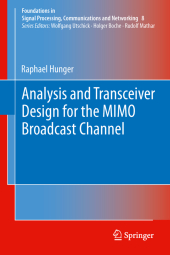 Neuerscheinungen 2014Stand: 2020-02-01 |
Schnellsuche
ISBN/Stichwort/Autor
|
Herderstraße 10
10625 Berlin
Tel.: 030 315 714 16
Fax 030 315 714 14
info@buchspektrum.de |

Raphael Hunger
Analysis and Transceiver Design for the MIMO Broadcast Channel
2013. 2014. x, 322 S. 235 mm
Verlag/Jahr: SPRINGER, BERLIN; SPRINGER 2014
ISBN: 3-642-43634-X (364243634X)
Neue ISBN: 978-3-642-43634-5 (9783642436345)
Preis und Lieferzeit: Bitte klicken
This award-winning volume analyzes the MIMO channel´s maximum high-power performance and answers the fundamental question of feasibility in quality-of-service based optimizations characterized by inelastic traffic that features strict delay constraints.
This book deals with the optimization-based joint design of the transmit and receive filters in MIMO broadcast channel in which the user terminals may be equipped with several antenna elements. Furthermore, the maximum performance of the system in the high power regime as well as the set of all feasible quality-of-service requirements is analyzed.
First, a fundamental duality is derived that holds between the MIMO broadcast channel and virtual MIMO multiple access channel. This duality construct allows for the efficient solution of problems originally posed in the broadcast channel in the dual domain where a possibly hidden convexity can often be revealed.
On the basis of the established duality result, the gradient-projection algorithm is introduced as a tool to solve constrained optimization problems to global optimality under certain conditions. The gradient-projection tool is then applied to solving the weighted sum rate maximization problem which is a central optimization that arises in any network utility maximization.
In the high power regime, a simple characterization of the obtained performance becomes possible due to the fact that the weighted sum rate utility converges to an affine asymptote in the logarithmic power domain. We find closed form expressions for these asymptotes which allows for a quantification of the asymptotic rate loss that linear transceivers have to face with respect to dirty paper coding.
In the last part, we answer the fundamental question of feasibility in quality-of-service based optimizations with inelastic traffic that features strict delay constraints. Under the assumption of linear transceivers, not every set of quality-of-service requirements might be feasible making the power minimization problem with given lower bound constraints on the rate for example infeasible in these cases. We derive a complete description of the quality-of-service feasibility region for arbitrary channel matrices.
System Models.- Dualities for the MIMO BC and the MIMO MAC with Linear Transceivers.- Rate Duality with Nonlinear Interference Cancelation.- Matrix-Based Gradient-Projection Algorithm.- MIMO BC Transceiver Design with Interference Cancelation.- Asymptotic High Power Analysis of the MIMO BC.- Description of the Quality of Service Feasibility Region.


